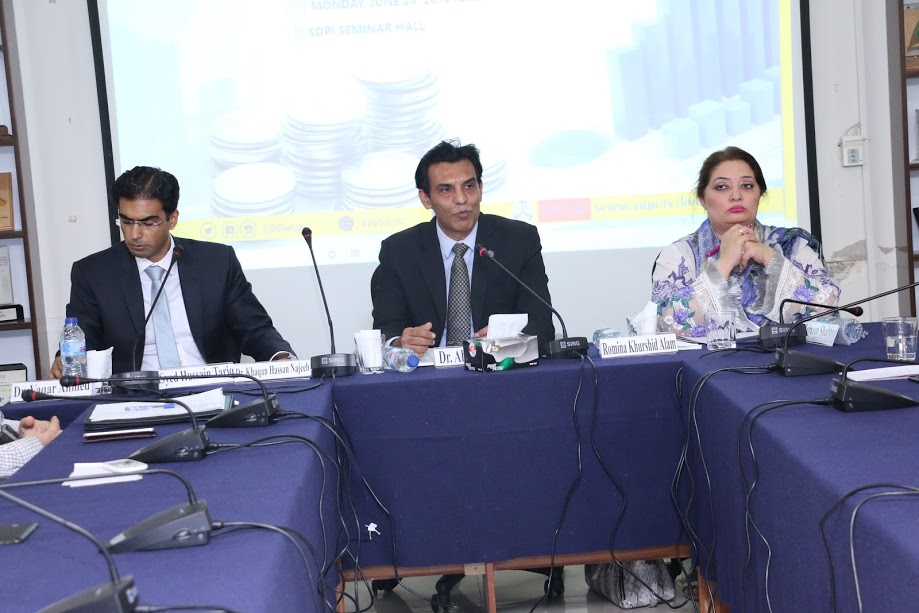Islamabad (Monday, June 24, 2019) Official Spokesperson and Advisor, Ministry of Finance, *Dr. Khaqan Hassan Najeeb* said the macroeconomic stabilization was need of the hour for the economy and this federal budget 2019-20 gives the direction of economic stabilization through curbing the imports and supporting the exports measures. This budget is directionally and strategically a strong budget. While addressing a public seminar titled “SDPI Post-Budget (2019-20) Analysis”, organized by the Sustainable Development Policy Institute (SDPI) at Islamabad, Dr Khaqan said this budget is rightly moving in this direction to help reduce the fiscal deficit, where fiscal deficit was around 7 percent of the GD. He said 11 per cent tax to-GDP ratio is not sustainable and expenses on civil and defence side need to be controlled.Dr. Khaqan said ambitious tax revenue target of 5555 billion rupee shows the direction of the budget, which indicates government objective to enhance its revenue collection through austerity measures and direct taxation. He said this budget is highly subsidized, where Ahsas program has been raised to 193 billion rupee from around 120 billion, electricity subsidy has been raised from 168 billion to 217 billion, there has been allocation for Naya Pakistan Housing Scheme and Kamyab Jawan Program to help protect the low strata of the society. He said custom duties on 1650 items have been decreased and tax target has been increased by 38 per cent, after comprehensive consultation with stakeholders to help strengthen the industry. However, there is need to improve regulatory regime with market development and need to be part of global value chain.He said macroeconomic stabilization has largely been gained, where current account deficit has been reduced and export has been picked up in quantitative terms. While commenting on the government amnesty scheme, Dr Khaqan said that this amnesty scheme is not for revenue generation but to tie-up with the tax revenue targets and to give a chance to tax evaders to become part of productive economy.
He said Benami Law of 2017 is now effective in the country which will be implemented from the 1st July 2019, whereas, the government has the details of 152 thousand expat’s foreign assets data and bank accounts, 14 thousands unregistered cars and data of transactions of domestic accounts. Now time has come to go after the tax evaders, where the category of non-filer is being abolished.*Dr Abid Qaiyum Suleri*, Executive Director, SDPI while analyzing the federal budget termed the state of economic as ‘neither good nor bad’, as claimed by the government or criticized by the opposition and media. He said first federal budget of PTI was more or less same like previous five budgets under IMF program. However, this time the federal government, after paying provincial share under National Finance Commission Award (NFC) would have left with only Rs. 3462 billion which will be spent on paying in debt payments. Whereas, all the expenditure under Public Sector Development Program, Defence expenditure and day to day expenses need to be financed by borrowing from the external sources.
He emphasized the need of synchronizing Federal Board of Revenue (FBR) and National Database and Registration Authority (NADRA) data with the help of technology as determining factor to help reach to tax evaders to achieve the ambitious target of 5555 billion rupee revenue collection. The government first priority needs to strengthen the social safety net, as budget hit hard to the poor and marginal segment of the society and least to the elite class, he emphasized. Government need to make the asset declaration scheme successful to get rid of the indirect taxes. Moreover to meet the Financial Action Task Force (FATF) conditions, the government should evolve a regulatory mechanism to document the gold and real-estate market where a substantial amount of assets and money is parked, he proposed.*Romina Khurshid Alam, MNA,* Pakistan Muslim League (Nawaz) said economy should not be politicized as country cannot run successfully without strong economy. She said the government needs to gain the confidence of public and bridge the trust deficit gap, where carrot and stick policy would not work. People of Pakistan suffered due to inability of the incumbent government to take decision to go early to IMF program which cost heavily to the economy, she added. She said the budget do not offer any relief to the public, especially in the social sector, where there is no substantial increase in health and education budgets. Due to poor policies of the government, everything has become expensive drastically, where poor and middle class is suffering a lot. There is no authority and regulatory mechanism in place to keep check on such inflations, which government needs to be looked at.
While commenting on accountability process in the country, she said that there should be accountability across the board, whereas, victimizing on political basis and witch-hunting is forcing the people to leave the country. We need to give confidence to the people to achieve the desire objective, she added.*Dr. Vaqar Ahmed,* Joint Executive Director, SDPI said to give greater certainty to the markets, government should also openly discuss the prior conditions and other conditionalities agreed with the International Monetary Fund. He said that the government is expecting Federal Board of Revenue (FBR) to collect much higher levels of revenues with the same administration which missed previous year’s revenue target. Therefore tax administration reforms must supplement the reform of tax policy. On the expenditure side of the budget, spending on general public services can be further reduced by consolidating and merging federal level ministries and divisions, he added. Dr Vaqar said the lack of import-driven or even debt-driven growth should be seen as an opportunity. A key trigger of growth now will be export-oriented foreign direct investment (FDI), if the government can clear the regulatory bottlenecks, he added. He emphasized the need of improvement in ‘ease of doing’ business indicators to achieve increased FDI and for that federal government will also require support from the provincial governments.-








